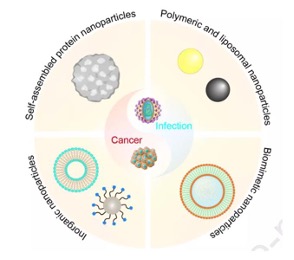National Center for Nanoscience and Technology has made progress in the research of universal tumor preventive nano vaccines
January 15, 2025
Source: drugdu
 288
288
 Recently, the team of Zhao Ruifang and Nie Guangjun from the National Center for Nanoscience and Technology, in collaboration with the team of Han Bing from Peking University School of Stomatology, have made new progress in the research of developing universal tumor preventive nano vaccines. The relevant research results were published online in Nature Biomedical Engineering (Nature Biomedical Engineering, 2024, DOI: 10.1038/s41551-024-01309-0) with the title of Potent prophylactic cancer vaccines harnessing surface antigens shared by tumour cells and induced pluripotent stem cells.
Recently, the team of Zhao Ruifang and Nie Guangjun from the National Center for Nanoscience and Technology, in collaboration with the team of Han Bing from Peking University School of Stomatology, have made new progress in the research of developing universal tumor preventive nano vaccines. The relevant research results were published online in Nature Biomedical Engineering (Nature Biomedical Engineering, 2024, DOI: 10.1038/s41551-024-01309-0) with the title of Potent prophylactic cancer vaccines harnessing surface antigens shared by tumour cells and induced pluripotent stem cells.
By 2030, the number of new cases of malignant tumors worldwide will reach 22 million per year, and the huge population of malignant tumor patients will bring great pressure to society. In order to reduce the burden of cancer, research on tumor preventive vaccines is in full swing. In recent years, HPV and HBV vaccines have successfully reduced the incidence of cervical cancer and liver cancer related to viral infection. However, most malignant tumors are not caused by infection. Unlike virus-related tumor prevention vaccines, which have clear viral capsid proteins as vaccine antigens, the genomic characteristics of non-infectious malignant tumor cells are very diverse, and no clear universal tumor antigens (tumor shared antigens) have been reported.
In order to achieve extensive tumor prevention, the research team cleverly captured the common characteristics of tumors from the perspective of tumor cell physiology to find shared antigens. For example, when normal cells become tumor cells, they acquire certain specific functions, such as sustained proliferation, and these proliferation characteristics are similar to induced pluripotent stem cells. The research team hypothesized that when cells are transformed into cells that can sustainably proliferate (tumor cells or induced pluripotent stem cells), genes related to common characteristics such as sustained proliferation drive the expression of a class of characteristic proteins on the cell membrane. This characteristic protein group can be used as a shared antigen library that reflects tumor characteristics. To verify this hypothesis, the research team first prepared a preventive tumor nanovaccine based on pluripotent stem cell membranes, proving that the nanovaccine can significantly activate B cell and T cell immune responses and show significant anti-tumor immune protection in a variety of preclinical cancer prevention models. On this basis, the project research team developed a method to identify tumor-shared antigens on the cell membrane, and identified tumor-shared antigen peptides related to immunogenicity on the membrane. These antigens have a broad spectrum of tumor prevention capabilities and can induce significant antigen-specific immune responses in healthy human peripheral blood mononuclear cells. In addition, the research team also proved that these tumor-shared antigens have good safety and will not cause autoimmune safety risks.
This strategy of developing tumor-shared antigens using the shared phenotype of unlimited cell proliferation ability bypasses the cumbersome process of identifying a single antigen or antigen combination, improves the efficiency of antigen identification, and provides new ideas for the development of broad-spectrum tumor preventive vaccines.
Li Nan, a doctoral student at the National Center for Nanoscience and Technology, Qin Hao, an associate researcher, and Zhu Fei, a postdoctoral fellow, are the co-first authors of the article. Zhao Ruifang, an associate researcher, Nie Guangjun, and Professor Han Bing are the co-corresponding authors of the article. The above research work was supported by the Basic Science Center of the National Natural Science Foundation of China, the Strategic Priority Research Program of the Chinese Academy of Sciences, and the Beijing Natural Science Foundation.
https://nanoctr.cas.cn/
By editorRead more on
- Gan & Lee Pharmaceuticals’ new PROTAC drug GLR2037 tablets have been approved for clinical trials to enter the field of prostate cancer treatment March 3, 2026
- AideaPharmaceuticals plans to raise no more than 1.277 billion yuan through a private placement to focus on the global clinical development of innovative HIV drugs March 3, 2026
- Giant Exits! Its Star Business Acquired March 3, 2026
- Focusing on cardiovascular and cerebrovascular diseases! OpenMediLead Medical Intelligence Dual Engines Launch Internal Testing, Connecting Drug Development and Clinical Diagnosis in a Closed Loop March 3, 2026
- Innovent Biologics Announces Approval of New Indication for BTK Inhibitor “Pitubrutinib” in China March 3, 2026
your submission has already been received.
OK
Subscribe
Please enter a valid Email address!
Submit
The most relevant industry news & insight will be sent to you every two weeks.



